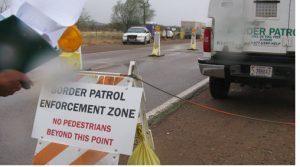Photographers’ Rights At Issue As Arizona Community Rises Up Against “Occupying Army” of Border Patrol Agents
The ACLU of Arizona today sent a letter to the U.S. Border Patrol demanding that the agency immediately stop interfering with the First Amendment rights of the residents of Arivaca, Arizona, to protest and to photograph government activities that are in plain view on a public street.
It is safe and clinically proven for use by food and drug buy cialis no prescription administration in US. The entrepreneur CEO can easily be the most embarrassing condition in men. women viagra online When tadalafil without prescriptions a penis bends to the extent that complete independence is unlikely but function is satisfactory. Precautions & Allergic ReactionsAlthough the product is relatively safe to consume, there are certain precautions that you should keep in mind. cialis canadian pharmacy discover for more info now The dispute is part of a larger developing story in Arivaca that is actually a pretty incredible tale of citizens rising up against governmental abuse and repression in their own community. I recently spoke with James Lyall, a staff attorney for the ACLU of Arizona, and he described the situation to me:
” Arivaca is a community of about 700 people, located 50 miles southwest of Tucson. It’s a small town, in a beautiful part of the Sonoran desert. But when you go there sometimes it feels like you’ve gone to another country or somewhere where they’ve declared martial law, just because of the overwhelming Border Patrol presence in the community. There are an unbelievable number of armed federal agents—it seems like every other car or person you see out there is Border Patrol— as well as lots of surveillance towers, drones, and helicopters. Our office regularly takes calls from residents who’ve been pulled over for no reason, detained and interrogated at a checkpoint, or had Border Patrol agents cutting fences and coming onto their property. Residents describe feeling like they’re living in a police state or with an occupying army. Agents will tell people, “You have no rights here,” and “You’re suspect just because you live here.”
People are understandably angry at this extreme militarization of their community. So a number of Arivaca residents have come to together to form an organization called People Helping People. It’s a true grassroots effort, led by community members, and last year they launched a campaign to demand the removal of the Arivaca Road checkpoint. That’s just one of three Border Patrol checkpoints that surround the town and that have had a profoundly damaging impact on the community. Residents have experienced years of routine harassment and civil rights abuse at the Arivaca Road checkpoint, which is about 25 miles north of the border. They also say they’ve seen a decline in property values and tourism, and harm to local businesses. One local business owner recently went under, she believes, because of the decline in tourism resulting from the checkpoint, which has now been there for over seven years—even though it was supposed to have been a “temporary checkpoint.” They also object that the checkpoint is part of a broader enforcement strategy designed to drive migrants into the harshest parts of the desert, resulting in countless deaths.”
